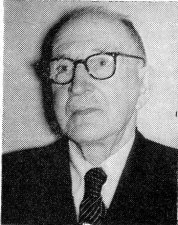
ALFRED J. TEARE. M.B.E. J.P.
[from Reminiscences of M.L.P.]

ALFRED J. TEARE. M.B.E. J.P.
by His Honour Ramsey JOHNSON, O.B.E..
In 1919, Alfred Teare was the most powerful figure in the Isle of Man, for during the previous year he had led the workers with such success that the Government had been compelled to accede to their demands.
He stood for the House of Keys for South Douglas at the General Election in 1919 and was returned at the top of the poll. Two important changes became effective in 1919 — adult suffrage was in operation for the first time, and the House of Keys elected Members to the Legislative Council for the first time.
Alfred Teare was re-elected at the General Elections in 1924, 1929, 1934 and 1946, with the remarkable record of heading the poll on each occasion. In 1951, he was elected to the Legislative Council by the House of Keys and remained a Member until last year, having served in the Legislature for the unusually long period of forty-three years.
The period from 1919 to 1962 is generally accepted as the most progressive period in the history of the Island, During this time, the Manx Legislature introduced Old-Age Pensions; it passed the Married Women's Property Act, giving married women the right to own property; it introduced National Insurance, providing for sickness and unemployment; it passed the Sex Disqualification Act, permitting women to sit in the House of Keys and on public bodies; it passed the Shop Hours Act, reducing the hours of opening for shops; the Education Act, which abolished Town and Parish School Boards and constituted the Education Authority; it brought into existence Local Authority Housing Schemes, and it enacted the Payment of Members' Expenses Act, which enabled those without private means to enter the Legislature.
Alfred Teare took a leading part in securing these great reforms.
I came into contact with Alfred Teare when I became a Member of the Keys in 1924. In the next year, I introduced the Rent Restrictions Bill (to which he refers in his reminiscences) which, in spite of many difficulties, became law, In this struggle I was greatly assisted by him. Later, we served together on many Commissions, Committees and other bodies.
When I was High Bailiff, he was one of my colleagues on the Douglas Licensing Court, and was indeed an ideal member. When the last war started he was again my colleague on the Civil Defence Commission, on which he was enthusiastic and energetic and gave me valuable assistance throughout the war. The chairmanship of the Licensing Commission was the last task which I have undertaken. I was glad to be able to secure Alfred Teare's appointment, and the Commission was greatly helped by his wise advice.
It has always been a delight to work with Alfred Teare. He is human and loveable, able and modest, tactful, loyal and conscientious, and he is trusted by everyone. He has devoted his life to championing the cause of the workers. But in fighting for them he has always been fair-minded.
I am glad that he has written his reminiscences of the struggles in which he has been engaged during the past half century. I have read them with gteat interest.
9th January, 1963.
|
|
||
| |
||
|
|
||
| Any comments, errors
or omissions gratefully received The
Editor HTML Transcription © F.Coakley , 2024 |
||